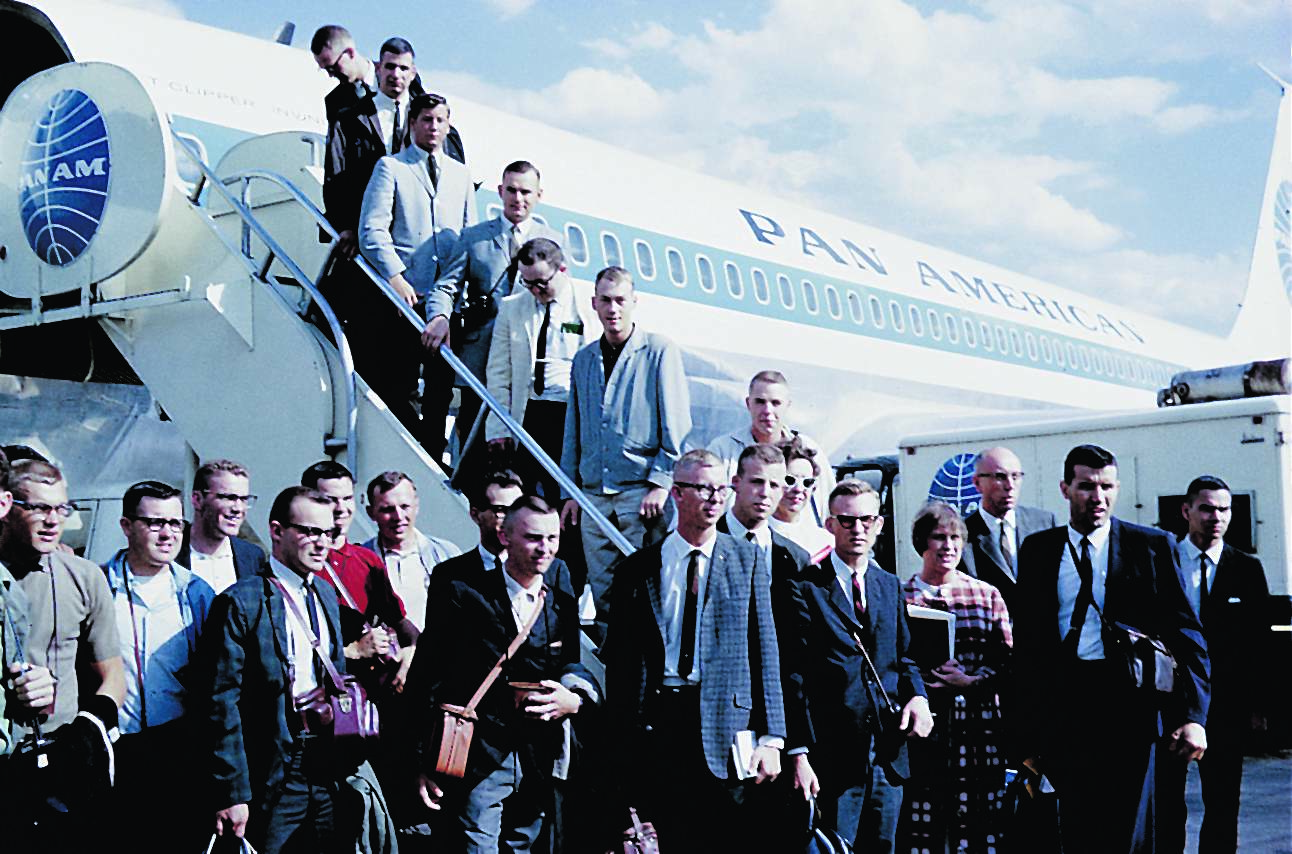
Ag Travel Course Shows Students The World For Decades
In the early morning hours of a 1964 summer day, 23 young men boarded a bus in front of the agronomy building to begin a month-long trip to Europe. That international trip— dubbed “The Ag Travel Course”—
was a model for the many study abroad travel courses offered through the college today. The trip was a partnership between the animal science and agronomy departments. Two professors led the group. Jim Kiser (’42 animal science) and Roger Mitchell (’54 agronomy, PhD ’61) chose Europe for that year’s annual travel course because, as Mitchell tells it, “We felt the European Economic Community was going to have a significant impact on U.S. agriculture.”
A student on the trip, Roy Bardole (’65 farm operations) brought home ideas he could use on his family farm near Rippey, Iowa. “Grazing techniques, the intensity of their agriculture, their hog production facilities—all were things that impressed me,” he says.
James Tiedje (’64 agronomy), now a university distinguished professor and director of the Michigan State University Center for Microbial Ecology, says that for him the course was “a unique opportunity. I wanted to see the world, without a gun. I was so motivated I took out my first loan. At that time, foreign study experiences were very rare.”
Gary Muller (’66 agricultural business), who farmed in southwest Iowa before retiring to Arizona, says he learned the price of land in Europe had nothing to do with productivity. “Land was valued at $3,000 to $4,000 an acre, but we were told land didn’t sell. If you wanted land, you had to inherit it,” Muller says.
Many of the participants had never been outside of Iowa. Muller now has traveled to more than 50 countries and calls the ag travel course a “springboard to a life of travel. Once your mind has been expanded by a new thought, it will never return to its original shape. That trip expanded our minds and we were never the same.”
Bardole has traveled to Europe extensively as an officer with the American Soybean Association. Tiedje often travels internationally, and is involved in the World Class University program in Seoul, South Korea, where he spends two months each year.
Mitchell, retired dean of the College of Agriculture, Food and Natural Resources at the University of Missouri, continues to encourage undergraduates by sponsoring an annual scholarship for Iowa State agronomy students with preference for those interested in pursuing international experiences.
In the summer of 1972, Ron Mortensen (’73 agricultural education and studies) participated in an ag travel course that took students to 13 European countries.
“I remember being at each of the Communist country borders waiting for at least an hour to have the officials look at our passports,” Mortensen says. “It showed us the value of our freedom in the United States.”
After graduation, Mortensen spent 12 years as a banker in Iowa and Chicago, with the last 25 years in Fort Dodge as a market consultant for farmers. “That trip gave me a great perspective of what it is like in other agricultural regions of the world,” he says. “It was my first big trip overseas. Since then I have been back to Europe numerous times and also traveled to Argentina, Brazil and Japan.”
Mary (Hagemann) Wiedenhoeft (’80 agronomy) has the unique perspective of having been both a student participant and later a faculty leader. In 1978, she spent a month in Europe where she says the group traveled “behind the Iron Curtain.”
“Eastern Europe looked very different from Western Europe and that made a great impact on us,” Wiedenhoeft says. “It was clear our lives are influenced not only by our natural environment—climate, landscape, soil resources, water resources —but also by the political environment.”
Now an agronomy professor at Iowa State, Wiedenhoeft teamed with Leo Timms, animal science professor, to lead students to New Zealand in 2007 and again this fall.
“I know students’ lives are changed when they step out of their comfort zone,” she says. “They learn about different cultures, natural environments, political environments, ways of doing things. They also learn about themselves.”
While agronomy and animal science have continued to partner on travel courses since the early 1960s, other departments have gotten in on the act. Twelve to 15 trips are offered each year through the College of Agriculture and Life Sciences.
Each has its own academic theme and is as different as the faculty who lead them. Some are done in partnership with other colleges at Iowa State while some are collaborations with other universities.




